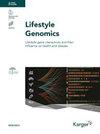表观遗传修饰作为运动干预与特定代谢改变相关的结果:一项系统综述
IF 1.4
4区 医学
Q3 GENETICS & HEREDITY
引用次数: 35
摘要
背景:慢性病是由不健康的生活方式引起的,主要表现为缺乏运动和饮食不均衡。有规律的体育活动可以改善健康,有一致的证据表明,这些改善可能是表观遗传学修饰的结果。目的:确定表观遗传学修饰是与特定代谢改变相关的运动干预的结果。方法:使用PubMed和EBSCO数据库进行文献综述,采用系统评价和荟萃分析方案(PRISMA-P)方法进行手稿研究和准备。在确定的2638篇文章中,只有34篇符合纳入标准。结果:综述的各部分按代谢变化进行组织,其中研究根据健康、患病和受过训练的个体进行分组。人类的抵抗运动诱导了与能量代谢和胰岛素敏感性相关的途径的表观遗传学变化,有助于骨骼肌的健康。耐力运动还通过改变DNA甲基化和特定miRNA的表达,导致与代谢改变相关的生物标志物发生改变。然而,为了获得更好的生理适应,抵抗力和耐力运动都是必要的,而且似乎需要将两者结合起来,以适当应对非传染性疾病日益普遍的情况。结论:鉴于现有文献的异质性和复杂性,目前尚不可能就运动的类型、强度或持续时间提出对不同人群(健康、患病和/或受过训练)有益的具体建议。尽管如此,这篇综述强调了运动对健康的重要性,并表明有必要在这一新兴领域进行更多的研究,以确定可以作为运动适应指标的表观遗传学生物标志物。本文章由计算机程序翻译,如有差异,请以英文原文为准。
Epigenetic Modifications as Outcomes of Exercise Interventions Related to Specific Metabolic Alterations: A Systematic Review
Background: Chronic diseases arise as a consequence of an unhealthy lifestyle primarily characterized by physical inactivity and unbalanced diets. Regular physical activity can improve health, and there is consistent evidence that these improvements may be the result of epigenetic modifications. Objective: To identify epigenetic modificationsas outcomes of exercise interventions related to specific metabolic alterations. Methods: The Preferred Reporting Items for Systematic Reviews and Meta-Analyses Protocols (PRISMA-P) methodology for manuscript research and preparation was followed using PubMed and EBSCO databases for literature review. Out of 2,638 articles identified, only 34 articles met the inclusion criteria. Results: The sections of the review were organized by metabolic alterations in which studies were grouped according to healthy, diseased, and trained individuals. Resistance exercise in humans induced epigenetic changes in pathways associated with energy metabolism and insulin sensitivity, contributing to healthy skeletal muscle. Endurance exercise also caused modifications in biomarkers associated to metabolic alterations through changes in DNA methylation and the expression of specific miRNAs. However, both resistance and endurance exercise are necessary to obtain a better physiological adaptation and a combination of both seems to be needed to properly tackle the increasing prevalence of non-communicable pathologies. Conclusion: Given the heterogeneity and complexity of the existing literature, it is currently not possible to propose a specific recommendation about the type, intensity, or duration of exercise that could be beneficial for different subsets of the population (healthy, diseased, and/or trained). Nevertheless, this review highlights the importance of exercise for health and shows the need to perform more research in this emerging area to identify epigenetic biomarkers that could serve as indicators of exercise adaptations.
求助全文
通过发布文献求助,成功后即可免费获取论文全文。
去求助
来源期刊

Lifestyle Genomics
Agricultural and Biological Sciences-Food Science
CiteScore
4.00
自引率
7.70%
发文量
11
审稿时长
28 weeks
期刊介绍:
Lifestyle Genomics aims to provide a forum for highlighting new advances in the broad area of lifestyle-gene interactions and their influence on health and disease. The journal welcomes novel contributions that investigate how genetics may influence a person’s response to lifestyle factors, such as diet and nutrition, natural health products, physical activity, and sleep, amongst others. Additionally, contributions examining how lifestyle factors influence the expression/abundance of genes, proteins and metabolites in cell and animal models as well as in humans are also of interest. The journal will publish high-quality original research papers, brief research communications, reviews outlining timely advances in the field, and brief research methods pertaining to lifestyle genomics. It will also include a unique section under the heading “Market Place” presenting articles of companies active in the area of lifestyle genomics. Research articles will undergo rigorous scientific as well as statistical/bioinformatic review to ensure excellence.
 求助内容:
求助内容: 应助结果提醒方式:
应助结果提醒方式:


